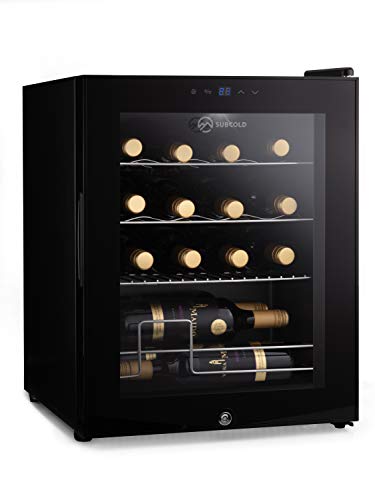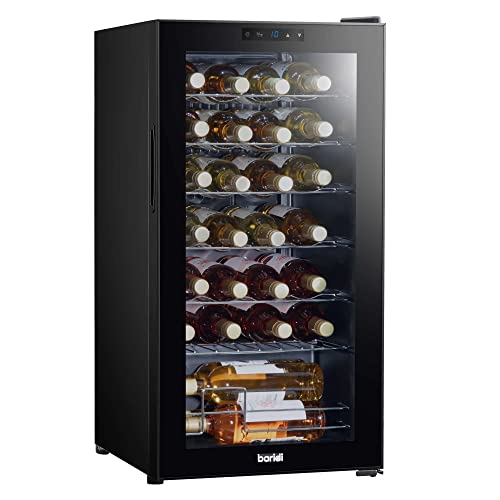Choosing a Beverage and Wine Refrigerator
Whether you're hosting guests or sipping a glass of wine with a meal, this dual-zone fridge is the perfect solution to keep and chill both wine and beers. It can be either freestanding or built-in, and features a seamless, seamless door that can be placed in any space.

While vibrations are generally harmless however, they can cause disturbance to the sediment in a bottle and trigger chemical reactions that might not be visible. In time, this can reduce esters and produce dull flavors.
Control of Humidity
Humidity is the amount water vapor that is present in the air. It fluctuates throughout the day because of various factors. Temperature, precipitation, wind and other environmental conditions can significantly affect humidity levels. It is important to maintain humidity at a high level for many reasons. Humidity can affect weather patterns and indoor air quality, and even the storage of wine. Many aromatic compounds in a wine are sensitive to variations in humidity. The wine's flavor can be affected by high humidity. It can alter the balance of these aromatic compounds. A wine refrigerator can help maintain the proper humidity level to preserve a bottle's taste.
A wine refrigerator can aid in preventing cork degradation and ensure that the seal is intact. If humidity is too low, corks can dry out and allow oxygen into the bottle, speeding up the aging process and tainting the wine's flavor. A wine refrigerator can help maintain an average humidity of 55% to 75% to prevent this from occurring.
While a wine cellar is intended for aging over time wine coolers can provide excellent storing conditions for beer and wines. They usually have designated areas for beer bottles, so you can store your favorite craft beers or lagers close to your preferred wines. These units are designed to balance temperatures and humidity to avoid condensation, which could damage labels and packaging.
Most models come with a hygrometer, which allows you to check the humidity levels in your
commercial wine chiller cooler and adjust it accordingly. You can also utilize a humidifier to increase the humidity inside your wine refrigerator.
If you choose to use a dehumidifier make sure it's in a separate area from the wine fridge. This will ensure that the dehumidifier does not absorb any of the wines or beers you're storing in your fridge. Humidity control is particularly important if you intend to store your wine for long durations of time. You might not notice any change in the taste of your wine for a short time but a lack of humidity can be a major influence on the taste of your favorite wines over months and years.
Vibration Absorption
The vibrations inside the wine refrigerator could interfere with the natural aging process for the wines that are stored there. Even small vibrations can cause sediment to move inside the bottle, triggering complex chemical reactions that will diminish esters and ruin the wine's taste as time passes. All La Sommeliere units have a vibration absorption system that reduces the sound and tremors, allowing your wine to age in peace and properly.
Aside from the fact that wine coolers typically emit less sound than normal refrigerators, they are predisposed to noise issues due to the arrangement of refrigerant circuits and fan systems that are found in the majority of units. This is why it is important to follow the clearance guidelines when installing your wine cooler, and to put the unit in a quiet area away from any other sources of noise.
It is also recommended that you clean your wine cooler regularly with a nonabrasive cleaner and let it "air out" for about a minute before filling it with bottles. This will reduce dust and dirt that may accumulate in the air vents.
In the end, if you notice that your wine refrigerator is producing excessive noise, it could be due to a malfunctioning
electric wine chiller fan or the compressor. The compressor is typically located in the back of the wine fridge and if it is not properly positioned or is struck by something behind it, it can shake itself free of its rubber mounts and produce loud humming sounds.
The compressor wine cooler functions like a standard refrigerator by electronically compressing air molecules which lowers their temperature, and then blowing them through the interior of the refrigerator. This type of cooling is much more energy-efficient than other cooling methods, like evaporator or frost-free refrigerators. Compressor wine coolers are noisy and require more frequent maintenance. For this reason, many consumers choose to purchase thermoelectric wine coolers that don't use compressor systems.
Temperature Control
Like wine, beer also has its own temperature requirements that help it keep its optimal flavor. It is important to select the right wine and beverage refrigerator that has adjustable temperature controls. This allows you to keep your drinks at the ideal temperature for storage and serving for each style. You can also find dual-zone models that provide an additional temperature zone for wine bottles and a separate temperature zone for other beverages or beer.
Generally speaking, the majority of beer styles prefer to be served colder than wine. The ideal temperature for serving a particular style will depend on the kind and the method of making it. For example, wheat beers and pilsners should be enjoyed between 40 and 50°F while sours, IPAs barleywines, and more robust ales should be served between 50 to 55 degrees Fahrenheit. Letting a beer warm up too long will create an unpleasant "skunk" smell that can detract from the overall enjoyment.
You'll need a wine refrigerator with a temperature range suitable for your favorite whites and reds. Some
wine refrigerators for sale fridges have humidity-control features to prevent oxidation, and keep the corks in good shape. Some
tall wine chiller refrigerators also come with a UV-blocking glass specifically designed to keep sunlight from damaging the wine and making it age prematurely.
The temperature control system of refrigerators can be powered either by compressor technology or thermoelectric cooling. Compressor-powered models use vapor compression to lower temperatures inside the wine fridge while thermoelectric models depend on electronic convection fan that circulate cool air through the refrigerator. For the best results, most refrigerators incorporate these two technologies.
If you're considering buying a beverage and wine fridge that utilizes compressor technology, consider buying one with shock pads that are vibration-resistant. This is because the vibration caused by compressor-based operation can interfere with the normal maturing process of wine and accelerate the process of oxidation.
You can buy a wine-specific refrigerator. However, it may be more affordable to purchase an ordinary fridge or regular refrigerator with a spacious interior and movable shelves. You can then customize the space to accommodate an array of wine, beer, as well as other bottles and cans.
Storage Options
Consider a beverage cooler If you are a host at events. These refrigerators can be used to store cans and bottles of beer, wine and other beverages that are ice cold, such as soda and water. They're available in
freestanding wine refrigerator and built-in models. Built-in models can be integrated
Under counter Wine fridge UK counters or into cabinets in kitchens with a limited space.

The two types of refrigerators are available in different styles and sizes which makes them suitable for most homes. Find models with sliding shelves to make it easier to locate your preferred beverages and wines. Some refrigerators have soft LED lighting that highlights your wine collection in a soft light. Some refrigerators also come with a humidity control feature.